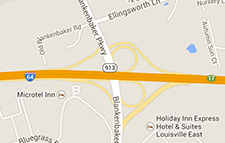Blog
Friday November 7, 2014
What to Expect if you are pulled over for a DUI Traffic Stop
posted by Jonathan Hodge
Tags: In the news
What to Expect if you are pulled over for a DUI Traffic Stop
First, the obvious: If you're drunk, don't drive.
Don't drive because you don't want to hurt someone else or yourself, and if you drive drunk, you put other people and yourself at risk. People die and are seriously injured every day as a result of driving drunk.
While driving drunk doesn’t always lead to injuries, you shouldn’t drive drunk because you also don't want to damage someone else’s or your own property. Car wrecks suck. Car wrecks because you were driving drunk suck a lot more.
Finally, don't drive because jail really sucks, and so does being prosecuted in court. Consider also that if you are pulled over and if there is even a remote possibility that you have been consuming alcohol, you will likely be arrested. There is because there is zero-tolerance for drinking and driving, and because there is a lot of money to be made by local government by prosecuting drunk driving charges, and because the legal burden in proving DUI is very low. Currently, Jefferson County Kentucky boasts of having a 92% conviction rate for all DUI charges.
If you are arrested and charged, your life is probably going to change for the worse. DUI convictions often lead to big losses in your life: you will lose your license, you will lose a lot of money (huge fines, insurance premiums will increase significantly) and you could lose your job.
As I said above, if an officer observes you driving and any of the tell-tale signs of alcohol consumption, you are a strong candidate for arrest and being charged for DUI. Also, you will be presumed responsible for any accident you are involved in regardless of whether or not you caused the accident. Of course you will have the opportunity to defend your actions in any civil and/or criminal matter in which you become involved. But understand that if alcohol is a factor, your defense of any such actions will have to address and overcome the stigma of being a drunk driver. This defense will of course be at your expense and it will be costly.
So, consider if you will that no matter how responsibly you drink, if you drive after drinking, there is a real possibility that you could be stopped, arrested, and convicted of drunk driving. Few people know how little alcohol must be consumed to reach or surpass the legal limit of 0.08% blood alcohol content (BAC). For most people, three or four drinks will satisfy the requirements of the legal limit. In Kentucky, you can also be convicted based solely on a police officer's claim that you were "impaired," even though your BAC was below the legal threshold.
So, how do you avoid DUI? Obviously, don’t drink if you drive, don’t drive if you drink. Get a sober driver or a cab. Or simply avoid drinking at the game, avoid drinking with dinner, avoid drinking at parties, avoid drinking at weddings, avoid drinking with your friends after work, and don’t drink if you drive anywhere. Few people will adhere to complete abstinence in these circumstances. So, if you choose to drink and drive, consider the following actions that you can take to reduce the chances of being stopped, investigated and arrested for DUI.
The stop
To begin the process, probable cause has to be present for a police officer to stop you and begin snooping for evidence of DUI. Police officers will often claim that the operator has committed a traffic violation which provides reasonable cause. Reasonable cause is also found by an officer that observes a defect in your vehicle’s equipment. Most often, however, the driver commits a maneuver that makes it appear that the driver could be intoxicated. Probable cause is stronger, and more appropriate for the police, where drivers and vehicles have committed more obvious violations or have glaring defects. Vehicles operated at a high rate of speed, swerving, oblivious lane changes and failures to use turn signals, failing to stop for traffic control devices and driving with one headlight/taillight are obvious reasons for a police officer to stop a motorist and inspect the driver.
Though it makes sense to check regularly anyway, drivers should inspect their vehicles for defects that will draw police scrutiny. Inspect and replace any lights that don’t operate properly. Check your headlights, taillights, clearance lights, brake lights and turn signals, center high-mount brake lights, and license plate lights. Ensure your headlights are aimed properly also. Make sure your license plates are properly affixed and readable. Correct anything that is not in specification.
Ensure that your registration stickers are current and legible. An expired registration sticker is a beacon to the police asking them to pull you over and begin a conversation with you about where you are going, where you have been and whether you have had anything to drink.
Also, aftermarket modifications are usually a good reason for the police to pull you over and strike up a conversation. Overly tinted windows, loud exhaust pipes, any broken lenses or parts, unrepaired body damage and cracked windows are all legitimate excuses for stopping your vehicle.
Traffic Laws
Obviously, obey all traffic laws or suffer the consequences. Nevertheless, operating a car while paranoid by driving under the speed limit, signaling your turn a half a mile before turning or not taking your turn at a stop sign may also lead to a stop. It is virtually impossible to drive more than a mile or two without violating some traffic law, so pull over, if you can, into a parking lot or otherwise avoid a patrol car from following you for a long distance, there will be less risk of being stopped for a traffic violation. And ALWAYS wear your seat belt… it’s a no brainer.
You've Been Stopped, Now What?
You have just been pulled over. It’s time to begin your conversation with the law. Under any other circumstance where you had not been consuming adult beverages, you would ask “so what?” But you have been drinking and are now at risk of arrest. What should you do?
First, always keep documents like your registration and insurance card in a readily accessible location. You don’t want to have to fish through your glove box, or worse, to not find these documents when you need them and the flashing lights are on and the officer is at your window.
Next, when you see the flashing lights and are instructed to pull over, find a safe place to pull over, always on the right side of the road whenever possible. Don’t pull over in a place that will begin raising the officers’ suspicions that you are impaired. Next, turn off your vehicle and turn on the interior light of your vehicle. Place both your hands on the steering wheel where the police officer can see them. This makes should help put him at ease and be more comfortable about his safety. It also conveys a sense of personal control on your part. If the opportunity presents itself before you are pulled over, roll down your window and air out your vehicle of any accumulated odors prior to actually stopping.
Understand that the officer is purposefully making personal contact with you in order to observe you with his sense of sight, his sense of smell and his sense of hearing. He will be searching for clues of intoxication. Evidence of intoxication that he is searching for includes: bloodshot eyes, soiled clothing, fumbling fingers, alcohol containers, drugs or drug paraphernalia, bruises, bumps or scratches, and any unusual actions that you may make. He will be listening for any signs of slurred speech, seeking your admissions of drinking, any inconsistent responses to his inquiries, abusive/confrontational responses from you, and any unusual statements that you may make. He will also be smelling the area and seeking to observe the smell of alcoholic beverages, marijuana, any “cover up” odors like breath sprays or cologne, and for any unusual odors that may be present.
When you speak to the officer, be courteous but admit to nothing. This cannot be emphasized enough. Often, the officer may attempt to put you at ease or even try to increase the stress of the traffic stop. The officer is attempting to solicit admissions or unusual responses to escalate the investigation. Not surprisingly, some motorists become friendly and talkative in response. Don’t do it. You must provide the officer only the information on your driver’s license, vehicle registration, or proof of insurance. Understand also that the officer will attempt to ask you questions to divide your attention, so by all means pay attention!
Remember also that any admission, however inconsequential, will be used against you. A response like “Officer, I just had two beers at the game” provides the officer with cause to investigate the matter further. Without that admission he must base his decision to pursue a DUI arrest on your driving, or mannerisms after that stop.
Your best response if the officer asks if you have been drinking is to ask "would you like to see my license?" or "why do you ask?" A burned-out headlight does not mean that you are impaired and neither does your refusal to chitchat about your night's events. Even if you have been drinking, you do not need to admit it or specify your activities in detail. “I have nothing to say on that,” is a good neutral response.
If the officer decides to continue his investigation, he may ask you to step out of your vehicle, which the courts say is permissible. The officer may ask you to perform certain physical tests, just to prove you're capable of driving safely. In Kentucky, these tests will be the HGN, or horizontal gaze nystagmus test, the walk-and-turn and one leg raise. Politely decline. You are not required to perform these tests and there is no penalty for refusal. The ONLY reason these tests are given is to give the officer justification to require you to take a chemical test (breath, blood or urine) to determine your BAC. Few people "pass" these roadside sobriety tests. Sometimes even sober of drivers fail them. Don’t argue with the officer, don’t berate the officer, don’t plead for him to release you, don’t try to bribe the officer, and don’t tell the officer about how you know or are ‘connected’ with other officers on the force. Just politely refuse the physical tests. If you have been drinking and are doing field sobriety tests, it’s highly probable you are going to be arrested and taken downtown for a BAC regardless of your performance.
Kentucky operates under an “implied consent statute.” This means that in return for your privilege to operate a motor vehicle in the state of Kentucky, you have consented to participate in performing tests to measure alcohol concentration or substance which may impair driving ability. KRS 189A.103. There will be penalties if you refuse to submit to these tests, including automatic suspension of your drivers’ license and enhanced penalties if you are convicted despite your refusal to submit. DUI attorneys are divided on whether to provide consent for a breathalyzer, blood, or urine test. On one hand, refusal can lead to an automatic administrative suspension of your license to operate a vehicle and enhanced penalties if you are subsequently convicted of DUI. On the other, the lack of test results makes the DUI case against you more difficult to prove.
Also, if you are not “impaired,” you want the traffic stop recorded on a video camera as evidence of a lack of impairment. Most police cars are equipped with video cameras for this purpose. However, officers may sometimes avoid turning the camera on if they think the resulting documentation will detract from the possibility of a conviction. You can ask the officer if his car has a video camera and if he has it turned on. If he does not have the camera turned on and you believe it would be helpful to your defense, ask him to turn it on record the stop.
This request sends a message that you are not afraid and are prepared to have your mannerisms and demeanor judged by an impartial judge or jury. It's very difficult for a police officer to claim your "speech was slurred" or that you were "staggering" when a video shows a composed articulate defendant being interrogated roadside by a uniformed, gun-toting agent of the law.
If you notice that the officer is intent on sticking a flashlight in your face or in your car, you can instruct the officer to keep the device away from your face and out of your vehicle. He is free to look into your vehicle, but only from the exterior, unless he requests to search your vehicle. NEVER voluntarily permit a search of your vehicle. To search your car, an officer must have probable cause or at least reasonable suspicion, a suspicion he must be able to explain in terms of what he is looking for and why he believes he will find this specific illegal item in your vehicle. There is absolutely no good that can come to you by voluntarily allowing the police to search your vehicle. The standard police response to “No you can’t search,” is “If you have nothing to hide, you would let me search.” Officers are highly trained and prepared for these encounters, and this is just one of the prepared responses that will be served and volleyed in your conversations. Know that if the officer had probable cause, or you were already under arrest, he’d search without asking.
Despite all evidence to the contrary, if the officer decides a chemical test is justified you typically have three choices of test procedures: breathalyzer, urine test, or blood test. Frequently, the police will use a breathalyzer test for the initial screening. However, you are sometimes afforded the option of taking one of the other two tests, at your request.
In Kentucky, if you submit to the BAC, you are then provided the statutory right[1] to have an independent blood test at your expense. Request it. Demand it. They will drive you to wherever you instruct. If they refuse to provide you the opportunity, they will not be permitted to use the BAC results that you gave them.[2]
You will also be given the opportunity to contact an attorney[3] before submitting to the tests. Have an attorney’s number in your phone and call them.
The consequences of a DUI conviction can be so severe that securing the services of an experienced attorney could help you take advantage of many factors in the case, including the challenge of questionable breath test results.
A legitimate police stop for a suspected drunk-driving incident should not have to rely on trick questions, sensing devices, or gimmicks to justify a chemical test of the driver. The driver's lack of control of the vehicle, his inability to reasonably react to questions and requests, and his physical reactions will be a dead give-away of his impaired condition. Unfortunately, the government, certain commercial interests, and self-serving organizations have institutionalized a negative stereotype of anyone who drinks and drives, no matter how responsibly. By labeling virtually all drivers who drink and drive as "drunk drivers," they have created a situation where responsible and constructive citizens are at risk of suffering huge fines, exorbitant insurance charges, loss of driving licenses, confiscation of personal property, and even incarceration, all for the singular act of violating an arbitrary BAC standard that doesn’t always signal impairment.
If you have further questions or need assistance please contact our office and ask for Jon Hodge.
[1] KRS 189A.103(7), which states in pertinent part:
“After the person has submitted to all alcohol concentration tests and substance tests required by the officer, the person tested shall be permitted to have a person listed in subsection (6) of this section of his or her own choosing administer a test or tests in addition to any tests administered at the direction of the peace officer. Tests conducted under this section shall be conducted within a reasonable length of time.”
[2] Suppression of the State's alcohol test is a sufficient sanction to be applied when the police fall short of the requirements pertaining to a request for independent testing; Commonwealth v. Long, 118 S.W.3d 178, 2003 Ky. App. LEXIS 244 (Ky. Ct. App. 2003),
[3] KRS 189A.105(3)
Comments




